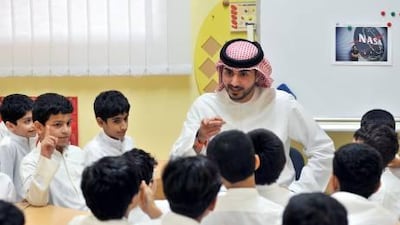UMM AL QAIWAIN // The Emirati Nasa intern Hazza Bani Malek began his talk at Al Watan School yesterday by asking his young audience what they wanted to be when they grew up.
Most of them shouted out responses such as policeman or army officer - two careers that have tempted many a young Emirati boy to drop out of school early.
"There are many other ways to serve the country," Mr Malek told them. "You can become a doctor, scientist, space explorer …"
Clutching Mr Malek's photograph, nine-year-old Abdul Aziz came up to him after the presentation and said: "I want to go to the moon."
"You have to have ambitions," Mr Malek told him. "Finish school, go to university and you can reach Nasa like I did."
Mr Malek, 21, was one of three Emiratis to become the first non-US citizens to train at Nasa in 2010 as part of an Arab Youth Venture Foundation (AYVF) initiative.
Yesterday, he and his peers – Abdulrahman Kalbat, Reem Ketait and Ahmed Al Menhali – began a roadshow sponsored by Mubadala and Boeing to encourage more government school pupils to become scientists, engineers and astronauts.
Their tour of schools began with talks at four government primary schools, mainly in remote areas of the country, and will continue for the rest of the year.
"Now that I have gained so much knowledge and experience from my time at Nasa, I think I have a responsibility to pass it on to these young people," said Mr Malek, who was surrounded by Umm Al Qaiwain pupils once his speech was done - all of them eager to hear more about outer space.
"Pupils have to be encouraged to continue studying and they need the proper guidance," he said. "Being UAE nationals we need to spend time with them and act as their role models."
The Government has faced a challenge steering Emiratis towards science majors. Only 30 per cent of pupils at government schools opt for the science stream.
Mr Malek, a mechatronics student at the Higher Colleges of Technology, Ras Al Khaimah, said most pupils were "afraid" of science and they had to change that perception.
"Science needs to be made relatable to the real world at schools," he said. "If it is taught with experiments, simulations and games it makes it more interactive and raises their interest."
The programme will also help tackle the issue of dropouts. One in five pupils who starts high school in the UAE drops out by Grade 12. Many boys find more lucrative jobs in the police and army and abandon higher education.
The Nasa internship programme was introduced by AYVF to inspire young Emiratis to take up other career paths. The foundation hopes to send another 20 Emiratis to the California-based Ames Research Center for a 15-week internship with Nasa in 2012.
Lisa LaBonte, the founder of AYVF and the Nasa-UAE programme, said the children needed role models they could "relate to and look up to".
"It is important to motivate them at a young age so that they can dream big and see the possibilities in various fields," she said.
Moza Obaid Al Mazruei, a teacher in Umm Al Qaiwain, agreed that the children needed something more than worksheets and books. "They display amazing enthusiasm when they meet such professionals and can touch and feel the things they learn," she said.
Nadia Fayez, a mother of two young boys at the Umm Al Qaiwain school, said more talks like these were needed to encourage the children to seek knowledge.
"It is nice to see my children learning so much from an Emirati who has gone to Nasa," Mrs Fayez said.
"I think they like it and I hope my boy decides to become an astronaut. That would be wonderful."
This article has been corrected since original publication. The original version stated that Hamad Rajab and Shamma Al Qassim took part in the roadshow this week, whereas it was Abdulrahman Kalbat, Reem Ketait and Ahmed Al Menhali who gave talks this week.

